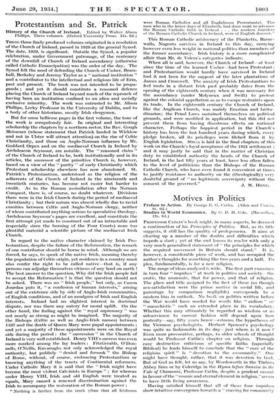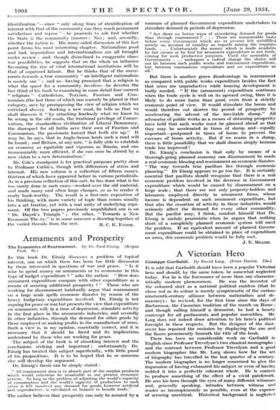Motives in Politics PROFESSOR CATLIN'S book might, in many aspects,
be deemed a continuation of his Principles of Politics. But, as its title suggests, it still has the quality of prolegomena. It aims at
clearing up a number of the doubts and difficulties which impede a start ; yet at the end leaves its reader with only very much generalized statement of " the principles for which the required movement in Britain should stand." It is, however, a considerable piece of work, and has occupied the author's thoughts for something like two years and a half. Its plea, fundamentally, is for a new religion. The range of ideas analysed is wide. The first part examines in turn four " impulses " at work in politics and society—the erotic, the economic, that for power, and that of religion. The place and title assigned to the first of these (as though sex-satisfaction were the prime motive in social life, and parentage by comparison negligible) corresponds to a Modern bias in outlook. No book on politics written before the War would have needed for words like " sadism " or " masochistic " such an extended place in its vocabulary. Whether this may ultimately be regarded as wisdom or as snbservience to current fashion will depend upon how
poSterity—say, fifty years hence —esteems the hypotheses of the Viennese psychologists. Herbert Spencer's psychology was quite as fashionable in its day—just where is it now ? Even more provocative, perhaps, to older schools of thought
would be Professor Catlin's chapter on religion. Through easy destructive criticisms of specific faiths (especially Biblical) he leads himself to conclude that the " core of the religious spirit " is " devotion to the community." One might have thought, rather, that it was devotion to God. But of God as felt, let us say, by Wordsworth in the Tintern
Abbey lines or by Coleridge in the Hymn before Sunrise in the Vale of Chamouni, Professor Catlin, despite a prudent caveat
in favour of the " cosmic and eternal element in religion," seems to have little living awareness.
Having satisfied himself that all of these four impulse!, show intuitive convergence towards a " craving for community identification "—since " only along lines of identification of interest with that of the community can they reach permanent satisfaction and repose "—he proceeds to ask first whether the State is the community (answer : No) ; and, secondly, whether the nation is. His many-sided discussion of this last point forms his most interesting chapter. Nationalism good and bad, imperialism and internationalism are all brought under review ; and, though disinclined to exaggerate class- war possibilities, he suggests that on the whole an influence favouring the rise of vital international institutions will be that of organized labour. But he thinks that of the move- ments towards a true community " an intelligent nationalism is merely one " ; and so—having premised that a religion is what the quest for a community involves—he devotes the last third of his book to examining in some detail four current " religions "—Catholicism, Toryism, Fascism and Com- munism (the last three of which can scarcely be placed in that category, save by presupposing the view of religion which we criticized above). Seeking a new road, he tells Its that we shall discover it " by attacking fearlessly what we know to be wrong in the old roads, the irrational privilege of Conser- vatism, the standardless civilization of Liberal Democracy, the disrespect for all faiths save their own of Fascism and Communism, the passionate hatred that both stir up." It may be, he says, that in Anglo-Saxon lands such a road will be found ; and Britain, at any rate, is fully able to establish an economy as equitable and vigorous as Russia, and one immeasurably more efficient, if she can once be stirred by a new vision to a new determination."
Mr. Cole's standpoint is for practical purposes pretty close to Professor Catlin's, though with differences of stress and interest. His new volume is a collection of fifteen essays, thirteen of which have appeared before in various periodicals. As in a previous collection of this sort, he has done what is far too rarely done in such cases—worked over the old material, and made many and often large changes, so as to render it really book-worthy. The result is a first-rate exposition of his thinking, with more variety of topic than comes usually into a set treatise, yet with a real unity of underlying argu- ment. Of the two papers previously unpublished one is on " Dr. Hayek's Triangle " ; the other, " Towards a New Economic The.ify," is in some measure a drawing-together of
the varied threads from the rest. R. C. K. ENSOR.





































 Previous page
Previous page